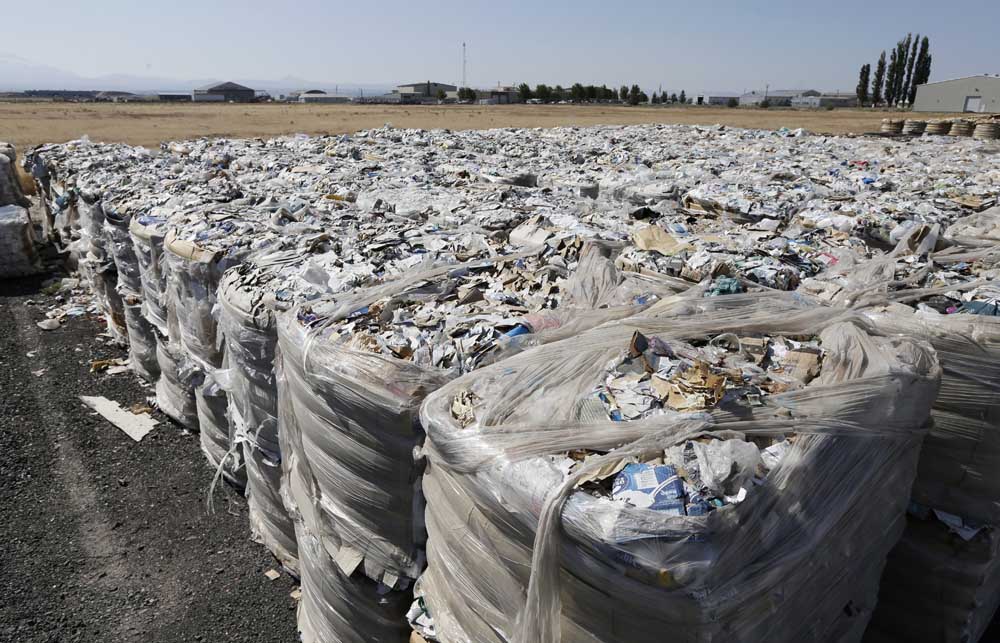What happens to material that was once recyclable?
Published 12:00 am Friday, August 3, 2018

- Bundles of mixed recycling sit piled up Thursday outside the Madras Sanitary Services facility in Madras. The facility has piled up the recyclables for approximately the past nine months after struggling to find a market for the materials. (Joe Kline/Bulletin photo)
The problem at Madras Sanitary Service isn’t the 210-ton stash of cardboard, plastic and other materials commonly found in mixed recycling bins that’s piling up at the recycling company. It’s the fact that there’s no place to send it, prompting company owners to consider a worst-case solution: Throw it into a landfill.
Melanie Widmer, president of the Jefferson County recycling company, said the problem began last year, after China announced that it would no longer accept most recyclables from the United States starting in 2018. The announcement panicked recycling agencies in Oregon and beyond, causing markets for plastic, paper and other materials to collapse.
Trending
With no affordable markets for Madras Sanitary Service’s material, it’s been stuck on the property, and the pile has slowly grown over weeks and months.
“We’re at the point where we need to make a decision,” Widmer said.
To get out from under the massive pile of material, the recycling company recently sought permission from the Oregon Department of Environmental Quality to dispose of the debris instead of recycle it, a process known as “a disposal concurrence.”
Madras Sanitary wouldn’t be the only Oregon company to use that solution. At least 26 recycling service providers have received permission to dispose of material that had once been recyclable. The approach was intended to be a short-term solution, a way to maintain recycling infrastructure.
“We wanted to design something that prepares for the worst-case scenario,” said Peter Spendelow, recycling specialist for Oregon DEQ.
However, the concurrence system has been in place for nearly a year, and Oregon DEQ is looking at extending it until more recyclers can find other places to send their materials, with no end to China’s restrictions in sight.
Trending
On Thursday, Oregon DEQ hosted a meeting in Portland with representatives from recycling service providers, cities and counties to gauge how much success they’ve had identifying new markets for their material. Many recyclers reported problems finding destinations for certain materials, including flimsier, less valuable types of plastic, and asked for disposal concurrence to remain in place.
“The low-value plastics are becoming increasingly difficult, if not impossible, to move,” said Dave Claugus, vice president with Pioneer Recycling Services, a recycling company with facilities in Clackamas and Tacoma, Washington, during the meeting.
The concurrence approach began last September, following China’s declaration. Spendelow said recyclers feared they would no longer have an end market for their material.
“Our processors were scared,” Spendelow said. “You’d be scared, too, if your biggest customer wasn’t going to take your material any more.”
After the announcement, prices for recyclables plummeted. Recyclable material can be disposed of under Oregon law if it costs more to recycle than it does to place it in a landfill.
Spendelow said public trust was a consideration, as well. Spendelow said entities that send material to a landfill publicize the amount of material they dispose of each month, lending transparency to the process. Once people stop recycling, Spendelow said, it can be difficult to get them to start again.
“The last thing we wanted … was for people to believe it’s all a big scam,” Spendelow said.
As of June 30, 26 recyclers had disposed of 11,490 tons of recyclable material since the start of September, though DEQ notes that the total constitutes only 2 percent of recyclable material collected in the state during that time.
Spendelow said concurrence was a way for recyclers to rid themselves of an unmarketable backlog before finding a more permanent solution. Since the start of the year, recycling providers in several cities, including Salem, Eugene and Medford, have reduced the list of items that can be recycled locally or sought rate increases.
So far, the changes appear to have paid dividends statewide. After nearly 3,000 tons of once-recyclable material went into landfills last November alone, just 623 tons were disposed of in June.
Still, Spendelow said most recyclers opted to renew their concurrences in August, citing the possibility that prices for paper and other products could decline before new markets materialize.
DEQ will hold another meeting this month to help determine how to move forward with the program.
In Madras, Widmer stressed that the concurrence is a one-time event, designed to eliminate the backlog until the company figures out a long-term strategy. Madras’ City Council is expected to vote on a 3 percent rate increase for Madras Sanitary Service, which the company said will help make it less cost-prohibitive to move material, later this month. In the meantime, more material is coming in.
“We have some room, but not that much room,” Widmer said.
— Reporter: 541-617-7818, shamway@bendbulletin.com








